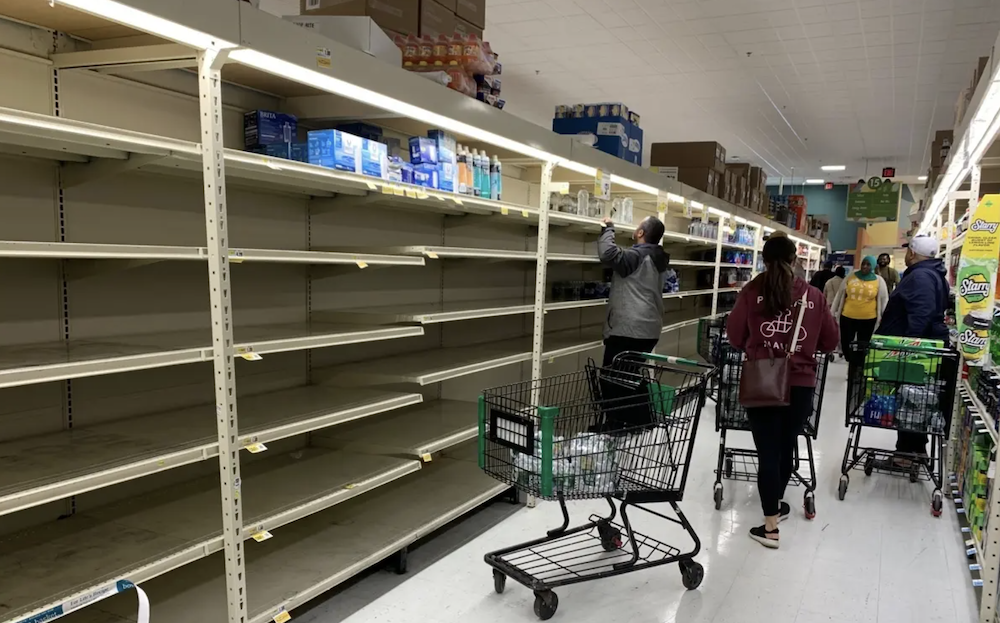“Did you get an alert?”
My wife looks up at me from her phone when she asks. I glance at mine. I didn’t get an alert. Neither did she. But her phone has started buzzing like crazy with messages. Friends are asking: “Do you have enough water?” I remember this feeling; it’s panic.
It’s Sunday. I’m out with my kids and my wife. We’re at a botanical garden about an hour outside Philly. The sun is a hard diamond and it’s the only thing in a vacant sky. The kids are in a good mood. They’re running like mad and their jacket buttons flash in the sun like burning magnesium.
The last time I felt panic this bad was March 2020. There was no soap or toilet paper. Everyone was getting sick. A lot of the workers who stock the food shelves or drive it to the stores were too sick to come to work, or they were dead. The papers ran stories about whether food supply lines would hold up. Back then, the bosses called workers heroes. That was a long time ago.
This time, there’s poison in the water. We only hear about it Sunday. But it happened three days ago — on Friday. I glance at my kids. The panic makes your fingertips tingle.
When I finally get the alert from the city government, it’s 5:00 p.m..
I open the Spider-Man water bottles, and I dump them out. I wonder what the water will do to the grass.
Don’t Drink the Water
We leave the garden. Our friends tell us: don’t go to city supermarkets. There’s a run on water. My neighbor works at one. She says people are fighting over the water. The shelves are empty. We start calling supermarkets to see if they have any.
We go to a supermarket outside the city. It’s a very wealthy place. It’s the kind of neighborhood where the CEOs of Comcast and Urban Outfitters live. The parking lot is filled with Mercedes. No one there is too worried; their water is clean.
But the workers there catch on quick when they see our shopping cart packed with water. “You from Philly?” one asks. Another worker, a lane over, says, “Are you OK?” We tell them the story. “Get home safe,” they say. The guy in the Brooks Brothers polo and the leather loafers — he’s walking to his Mercedes — doesn’t look up.
We have to Google what happened Friday. This is what we learn: the Trinseo Altuglas chemical plant dumped thousands of gallons of poisonous chemicals into the Delaware River on Friday. We’re told it’s an accident, a result of “overflow.” If you’re not from Philly, you might not not know the Delaware runs the length of the city’s east side, and most of its drinking water comes from it.
No one knows how much went in. Articles say it’s “at least” 8,000 gallons. But the company’s spokesperson said there’s no way to know for sure. Triple that? The corporation’s bosses have no idea.
It’s a “latex finishing chemical.” It includes the same material — butyl acrylate — that poisoned Palestine, Ohio in the train derailment from a few weeks ago. That disaster felt far away from Philly yesterday. Though one supermarket here has been selling water bottled in Palestine, Ohio — with the same chemicals in it, maybe. Not so far away after all.
When the chemical plant’s bosses respond, they sound bored by the inconvenience. The company is “conducting a thorough assessment of all our systems … to close any gaps,” says the CEO.
We get another alert from the city on Sunday night. It says that we can still drink the water — but only until Monday night. The chemicals are taking their time. The alert says we should start filling pitchers and leaving them around the house.
It doesn’t say when we can drink our water again.
The Cure for Panic Is Revolutionary Hope
Welcome to capitalism. Poison water is the cost of profits for the bosses. It’s not hard to see why. A business needs to maximize its profits to out-compete other corporations. That means: slash costs, reduce the workforce to a minimum, speed up everything.
And that’s only become more true in the last forty years. That’s when the ruling rich enacted a historic frontal attack on workers and oppressed people, using a model of government policy and economics called “neoliberalism.” It means, among other things, dismantling unions so that working class people can’t fight back.
This has made it easier to organize production and transportation according to the “just-in-time” model. In other words: make profits flow faster by weakening workers, speeding up processes, cutting down lag time. All of this really does accelerate profits. It also makes the entire supply chain far more fragile. Breakdowns come next. Poison isn’t a bug — it’s a feature. This time it’s poisoned water in Philadelphia. A few weeks ago, it was the poisoning of water (and air, and soil) in Palestine, Ohio. Last year it was poisoned baby formula. In 2014 it was the poisoned water flowing through pipes in Flint, Michigan.
In Philly, it’s like we’re looking through a viewfinder toy, seeing, in miniature, what a system based on profit does to the people who do all its work — the working class — and the environment.
A new UN report says the destruction is speeding up. A Washington Post headline sums up that report: “World is on brink of catastrophic warming.”
The world is likely to pass a dangerous temperature threshold within the next 10 years, pushing the planet past the point of catastrophic warming — unless nations drastically transform their economies and immediately transition away from fossil fuels, according to one of the most definitive reports ever published about climate change.
The environment isn’t the only thing that’s changing. In other places — like France — working people are showing us a very different path forward. Thousands on thousands are going on strike and fighting in the streets against the bosses and the politicians who work for them. There, it’s about a bogus pension reform. But we’re going to need a response like that here. The “French March” shows us: we have a right to revolutionary hope. It’s hope in ourselves to change the world.
Eduardo Castilla said it right: “In our chaotic world, the future can only be built in the streets.” There’s a cure for panic and it’s fighting back. No CEO and no politician in a party for millionaires is going to help us. They had their chance, and they couldn’t and wouldn’t. With more and more intense environmental disasters, we are the ones we have been waiting for.
My kids will start to feel the panic soon too as they grow up. They probably already do at some level. I can’t stop that. But they’ll feel something else too: they can be part of the fight to change this wretched system. Later, they’ll take their kids to a museum and show them a rotted Trinseo Altuglas sign, and explain.
If we want our own kids to be able to drink the water and save the planet, we’re going to have to fight it out with all the real weapons at our disposal: strikes, marches, pickets — and a revolution to get the ruling rich out of power. For a society run by working people. It’s been done before.










